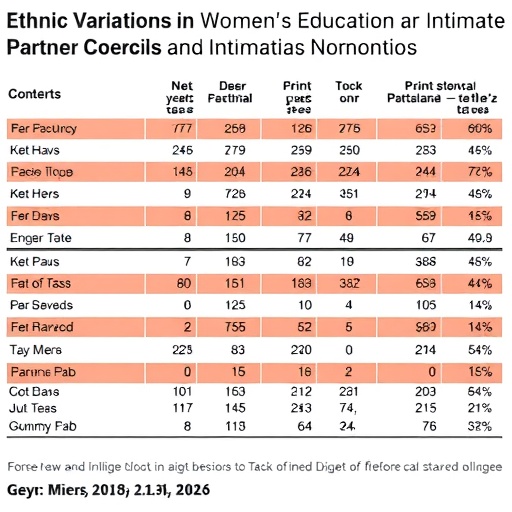In recent years, the complex interplay between educational attainment and experiences of sexual coercion among intimate partners has garnered increasing attention in academic circles, particularly within diverse geographic and ethnic contexts. A pivotal study conducted by Thi Thuy Do and P. Sukontamarn sheds light on the ethnic differences observed in Vietnam regarding women’s educational levels and their susceptibility to sexual coercion from intimate partners. This research highlights not only the alarming realities confronted by many women but also underscores the critical role that education plays in fostering empowerment and reducing vulnerability in intimate relationships.
The findings of this study are particularly significant as they delve into the socio-cultural dynamics that contribute to different experiences among ethnic groups in Vietnam. By employing a thorough qualitative analysis, the researchers were able to uncover various factors that fuel incidents of sexual coercion, including traditional beliefs, economic dependency, and the prevailing gender norms that dictate relational hierarchies. Their approach effectively illustrates how these elements intersect, ultimately shaping the lived realities of women across differing ethnic backgrounds in the country.
Women’s educational attainment is a vital component in the quest for gender equality and freedom from violence. This research highlights how education equips women with critical life skills and a greater sense of agency, which can act as a protective barrier against coercive behaviors in intimate relationships. The interplay of education and empowerment emerges as a theme that resonates throughout the findings, demonstrating a clear correlation between higher educational levels and reduced incidences of sexual coercion among intimate partners.
Analyses indicated significant ethnic differences—wherein women belonging to certain ethnic minorities faced disproportionately higher rates of sexual coercion compared to their counterparts from more dominant ethnic groups. The researchers emphasized that these disparities cannot be solely attributed to individual circumstances, but are entrenched within broader societal structures that perpetuate inequality. The study thus serves as a call to action, urging policymakers to reckon with these variations and tailor interventions appropriately.
Furthermore, the researchers utilized a robust methodological framework, analyzing quantitative data gathered from various surveys while also integrating qualitative insights through interviews. This mixed-methods approach allowed for a nuanced understanding of individual experiences, facilitating an exploration of the psychological and emotional ramifications of sexual coercion, along with the socio-economic challenges that inhibit women from seeking help or exiting abusive situations.
In discussing educational attainment, the study also highlights the systemic barriers that hinder women’s access to quality education, particularly in rural areas or among indigenous communities. These barriers include financial constraints, cultural norms favoring male education, and inadequate infrastructure. The authors convincingly argue that improving educational access for women is not only a moral obligation but also a strategic imperative to combat gender-based violence effectively.
The topic of intimate partner violence remains a global epidemic, with cultural norms and expectations playing a crucial role in shaping women’s experiences. In Vietnam, the embedding of patriarchal values contributes to a landscape where many women may feel powerless to challenge coercive behaviors from partners. As a result, the authors emphasize the necessity of community-based initiatives aimed at reshaping societal attitudes and dismantling harmful stereotypes that perpetuate cycles of violence and control.
The implications of these findings stretch beyond the immediate context of Vietnam, offering insights applicable in various international settings grappling with similar issues. Honoring the diversity of women’s experiences is paramount to developing effective preventive strategies and support mechanisms. The authors argue that understanding the intersectionality of ethnicity, education, and gender can lead to more tailored and impactful interventions that account for the multifaceted nature of these challenges.
Importantly, the study sheds light on the evolving discourse around women’s rights, illuminating how educational empowerment serves as a catalyst for broader social change. When women are equipped with education, they are not only better positioned to advocate for themselves but also to contribute positively to their communities, fostering environments where gender-based violence is less tolerated and addressed more proactively.
In summary, the findings of this research compel us to reconsider the structural inequalities that persist within intimate relationships, particularly in a culturally rich yet often patriarchal context like Vietnam. As educational access continues to expand, it holds the promise of transforming the social landscape, providing women with the tools necessary to combat sexual coercion effectively. As scholars and advocates continue to address these pressing issues, the work of Thi Thuy Do and P. Sukontamarn stands as a vital contribution to understanding the urgent need for education as both a protective factor and a means of empowerment against gender-based violence.
Subject of Research: Women’s educational attainment and sexual coercion by intimate partners in Vietnam.
Article Title: Women’s educational attainment and sexual coercion by intimate partners: ethnic differences in Vietnam.
Article References: Thi Thuy Do, H., Sukontamarn, P. Women’s educational attainment and sexual coercion by intimate partners: ethnic differences in Vietnam. J Pop Research 41, 28 (2024). https://doi.org/10.1007/s12546-024-09350-1
Image Credits: AI Generated
DOI: 10.1007/s12546-024-09350-1
Keywords: Educational attainment, sexual coercion, intimate partners, ethnic differences, Vietnam, women’s rights, gender-based violence.




